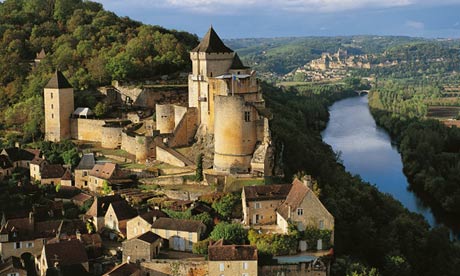
From Henry V to Peter Mayle, Britons have long been invading France with enthusiasm in order to claim a small corner of it for themselves.
But figures published by the Office for National Statistics suggest that the nation's love affair with the chateaux of the Dordogne and the patisseries of Paris may be on the wane, with visitor numbers having slumped by a fifth in four years.
The ONS's annual survey of travel trends found that British visitors to France numbered 8.8 million in 2012, well down on the 2008 figure of 10.9 million. Even more gallingly for the Gauls, while visits to North America were also down last year by 7.5% to 3.4 million, Spain, Belgium, Italy and Norway all saw the number of British visitors rise, with 2.3 million more Britons visiting Spain than France last year.
The reasons for the cooling of our French love affair were not clear, said Roger Smith, principal researcher for the ONS and the report's author. Thanks to a combination of the Olympics, the Jubilee and the wettest April to June on record, 2012 was "an unusual year", he said.
Spanish visitors fell by 1.2 million in 2009/10, but "what's happened there in the last couple of years is that visitor numbers have clawed their way back to where they were". France has not yet reversed its decline.
Jeremy Waldron, director of marketing at the Association of British Travel Organisers to France, linked the country's decline in popularity to the financial crisis and unfavourable exchange rates. While families may be seeking cheaper deals in the package destinations in which Spain excels, "France is not seen as a cheap destination," he said. "You go to France, to some extent, for Frenchness, not just for the destination."
Others see Spain and Italy's financial woes as boosting their popularity, at France's expense. "With the eurozone crisis Spain and Italy … have become much cheaper of necessity," said Derek Moore, chairman of the Association of Independent Tour Operators, while "in France prices continue to rise".
In addition, he said, "local governments had stopped the massive handouts Ryanair and the like demand to fly to destinations," leading to low-cost carriers pulling out of some routes to France.
Waldron sees the Olympics as a factor, suggesting the family and camping sectors which saw a slump were hit by families staying in Britain to watch the Games. "Every event was packed, and I think many of those people had decided not to go abroad. When they were standing on the streets in August, they were not on holiday in France."
The overall number of trips abroad by UK residents fell by 0.5% in 2012. Incoming tourist numbers last year were up by 0.9% on 2011, although the number of those who came during the third quarter, during which the Games were held, was down on the previous year. But in part because those visitors, a total of 471,000 came specifically for the Games, spent more than in the previous year on average, earnings from visits to Britain rose by 3.6% to £18.8bn.
It means that the deficit between the amount Britons spend overseas each year and the amount visitors spend here has shrunk from £20.5 billion in 2008 to £13.8 billion last year, something which Smith describes as "a very interesting aspect to continue to watch".

